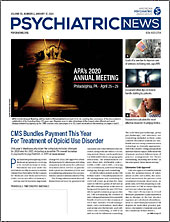Sage’s Treatment for Major Depression Fails Phase 3
In December Sage Therapeutics announced that its investigational oral drug SAGE-217 did not meet its primary endpoint in a phase 3 trial for major depressive disorder. In the MOUNTAIN Study, patients given 30 mg of SAGE-217 daily had greater decreases from baseline on the 17-item Hamilton Rating Scale for Depression (HAM-D) at days 3, 8, and 12 compared with those who received placebo. However, on day 15, there was no statistically significant reduction from baseline compared with placebo between the two groups.
An analysis of the results revealed that approximately 9% of patients assigned to the active drug group did not take the medication. After accounting for this, further analysis suggested that a statistically significant reduction in HAM-D scores persisted through day 15.
Earlier this year, the ROBIN Study, another phase 3 trial, suggested that the drug may reduce symptoms of postpartum depression within two weeks.
FDA Grants Psilocybin Breakthrough Status for Depression
In November 2019 the FDA granted Breakthrough Therapy designation to psilocybin, in development by the Usona Institute, for the treatment of major depressive disorder. The FDA grants Breakthrough Therapy status to expedite the development and review of drugs that are intended to treat a serious condition when preliminary clinical evidence indicates that the drugs may demonstrate substantial improvement over available therapies.
Usona recently launched a phase 2 clinical trial of psilocybin that will include 80 patients aged 21 to 65 years with depression. The trial will compare a single 25 mg oral dose of psilocybin with a single 100 mg oral dose of niacin, a form of vitamin B3, which will serve as a placebo. The primary outcome will be reduction on the Montgomery-Åsberg Depression Rating Scale total score from baseline to day 8.
FDA Warns 15 Companies for Illegally Selling Cannabidiol Products
In November the FDA sent warning letters to 15 companies for selling cannabidiol (CBD) products in ways that violate the Food, Drug, and Cosmetic Act. The violations include marketing CBD products to treat diseases or for other therapeutic uses for humans or animals, marketing CBD products as dietary supplements, and adding CBD to human and animal foods. Furthermore, some of the products were marketed for infants and children.
The FDA also published a revised Consumer Update detailing safety concerns about CBD products. In a statement, the agency said that it “cannot conclude that CBD is generally recognized as safe … among qualified experts for its use in human or animal food.”
An FDA statement that includes the names of the companies involved is posted
here. The revised Consumer Update is posted
here.
Pimavanserin Shows Promise for Negative Symptoms of Schizophrenia
Patients who took Nuplazid (pimavanserin) in addition to their regular antipsychotic medication experienced statistically significant reductions in negative symptoms of schizophrenia compared with those who took placebo and their regular antipsychotic medication, Acadia Pharmaceuticals announced in November.
In the phase 2 ADVANCE study trial, 403 patients with predominantly negative symptoms (such as withdrawal, apathy, and anhedonia) were randomized to receive once-daily pimavanserin or placebo as an adjunct treatment to their ongoing antipsychotic in a flexible-dosing regimen. The starting daily dose of 20 mg of pimavanserin at baseline could have been adjusted to 34 mg or 10 mg during the first eight weeks of treatment. At 26 weeks, those in the pimavanserin group experienced a mean reduction of 10.4 points on the Negative Symptom Assessment-16 total score, compared with a reduction of 8.5 points for the placebo group. Those who took the highest dose of pimavanserin experienced a mean reduction of 11.6 points.
In July Acadia announced that although adding pimavanserin to existing antipsychotic treatment improved psychotic symptoms in a six-week phase 3 trial of people with schizophrenia (as demonstrated by change from baseline in the Positive and Negative Syndrome Scale), the results were not clinically significant.
Unapproved Drug Found in Some Cognitive Supplements
People who buy cognitive enhancement supplements may be exposed to high dosages of piracetam, a drug currently not approved in the United States, a study in JAMA Internal Medicine has found. Piracetam is prescribed in many European countries for cognitive impairment, dementia, and other conditions, but the FDA does not allow its sale either as a drug or a supplement in the United States.
Peter A. Cohen, M.D., of the Cambridge Health Alliance and Harvard Medical School and colleagues analyzed 10 samples from five brands of supplements that they found and bought online. Eight samples from four brands contained from 831 mg to 1,542 mg of piracetam per serving size. Some brands recommended daily servings that could expose people to more than 11,000 mg of piracetam per day—much higher than the European doses of 2,400 mg to 4,800 mg per day.
The authors noted that adverse effects of piracetam include anxiety, insomnia, agitation, depression, drowsiness, and weight gain.
“Until the law governing supplements is reformed such that products adulterated with drugs can be effectively removed from the market, clinicians should advise patients that supplements marketed as cognitive enhancers may contain prohibited drugs at supratherapeutic doses,” the researchers concluded.
“Presence of Piracetam in Cognitive Enhancement Dietary Supplements” is posted
here. ■
